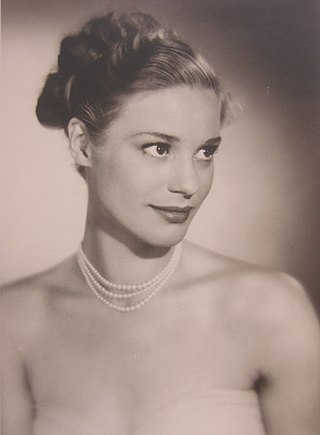Related Research Articles

Ingrid Lilian Thulin was a Swedish actress and director who collaborated with filmmaker Ingmar Bergman. She was often cast as harrowing and desperate characters, and earned acclaim from both Swedish and international critics. She won the Cannes Film Festival Award for Best Actress for her performance in Brink of Life (1958) and the inaugural Guldbagge Award for Best Actress in a Leading Role for The Silence (1963), and was nominated for a Best Supporting Actress BAFTA for Cries and Whispers (1972).

The Guldbagge Awards is an official and annual Swedish film awards ceremony honoring achievements in the Swedish film industry. Winners are awarded a statuette depicting a rose chafer, better known by the name Guldbaggen. The awards, first presented in 1964 at the Grand Hôtel in Stockholm, are overseen by the Swedish Film Institute. It is described as the Swedish equivalent of the Academy Awards.
The Guldbagge for Best Film is a Swedish film award presented annually by the Swedish Film Institute (SFI) as part of the Guldbagge Awards to the best Swedish motion picture of the year.
The 49th Guldbagge Awards ceremony, presented by the Swedish Film Institute, honored the best Swedish films of 2013 and took place January 20, 2014, at Cirkus in Stockholm. During the ceremony, the jury presented Guldbagge Awards in 19 categories. The ceremony was televised in the Sweden by SVT, with actress and comedian Sissela Kyle hosting the show for the third time. The ceremony also celebrated the prize's 50th anniversary.
The Guldbagge for Best Director is a Swedish film award presented annually by the Swedish Film Institute (SFI) as part of the Guldbagge Awards to directors working in the Swedish motion picture industry.
The Guldbagge for Best Actor in a Leading Role is a Swedish film award presented annually by the Swedish Film Institute (SFI) as part of the Guldbagge Awards to actors working in the Swedish motion picture industry.
The 4th Guldbagge Awards ceremony, presented by the Swedish Film Institute, honored the best Swedish 1966 and 1967, and took place on 9 October 1967. Persona, directed by Ingmar Bergman, was presented with the award for Best Film.
The 9th Guldbagge Awards ceremony, presented by the Swedish Film Institute, honored the best Swedish films of 1972 and 1973, and took place on 29 October 1973. Cries and Whispers directed by Ingmar Bergman was presented with the award for Best Film.
The Guldbagge for Best Actress in a Leading Role is a Swedish film award presented annually by the Swedish Film Institute (SFI) as part of the Guldbagge Awards to actresses working in the Swedish motion picture industry.
The 14th Guldbagge Awards ceremony, presented by the Swedish Film Institute, honored the best Swedish films of 1977 and 1978, and took place on 18 September 1978. The Adventures of Picasso directed by Tage Danielsson was presented with the award for Best Film.
The 15th Guldbagge Awards ceremony, presented by the Swedish Film Institute, honored the best Swedish films of 1978 and 1979, and took place on 24 September 1979. A Respectable Life directed by Stefan Jarl was presented with the award for Best Film.
The 16th Guldbagge Awards ceremony, presented by the Swedish Film Institute, honored the best Swedish films of 1979 and 1980, and took place on 22 September 1980. To Be a Millionaire directed by Mats Arehn was presented with the award for Best Film. The awards for Best Director and Best Actress were not presented.
The 17th Guldbagge Awards ceremony, presented by the Swedish Film Institute, honored the best Swedish films of 1980 and 1981 and took place on 30 October 1981. Children's Island directed by Kay Pollak was presented with the award for Best Film.
The 18th Guldbagge Awards ceremony, presented by the Swedish Film Institute, honored the best Swedish films of 1981 and 1982, and took place on 10 October 1982. The Simple-Minded Murderer directed by Hans Alfredson was presented with the award for Best Film.
The 19th Guldbagge Awards ceremony, presented by the Swedish Film Institute, honored the best Swedish films of 1982 and 1983, and took place on 31 October 1983. Fanny and Alexander directed by Ingmar Bergman was presented with the award for Best Film.
The 21st Guldbagge Awards ceremony, presented by the Swedish Film Institute, honored the best Swedish films of 1985, and took place on 27 January 1986. My Life as a Dog directed by Lasse Hallström was presented with the award for Best Film.
The 22nd Guldbagge Awards ceremony, presented by the Swedish Film Institute, honored the best Swedish films of 1986, and took place on 2 February 1987. The Sacrifice directed by Andrei Tarkovsky was presented with the award for Best Film.
The 23rd Guldbagge Awards ceremony, presented by the Swedish Film Institute, honored the best Swedish films of 1987, and took place on 1 February 1988. Pelle the Conqueror directed by Bille August was presented with the award for Best Film.
The 24th Guldbagge Awards ceremony, presented by the Swedish Film Institute, honored the best Swedish films of 1988, and took place on 6 March 1989. Katinka and Back to Ararat were presented with the award for Best Film.
The Guldbagge Honorary Award, instituted in 2000 for the 36th Guldbagge Awards, is a Lifetime achievement Award presented annually by the Swedish Film Institute (SFI) as part of the Guldbagge Awards to people working in the Swedish motion picture industry.
References
- ↑ "Värdar, tid och plats för alla Guldbaggegalor" (in Swedish). The Swedish Film Database. Retrieved 19 February 2014.
- ↑ "Tystnaden (1963)". Swedish Film Institute. 24 February 2014.